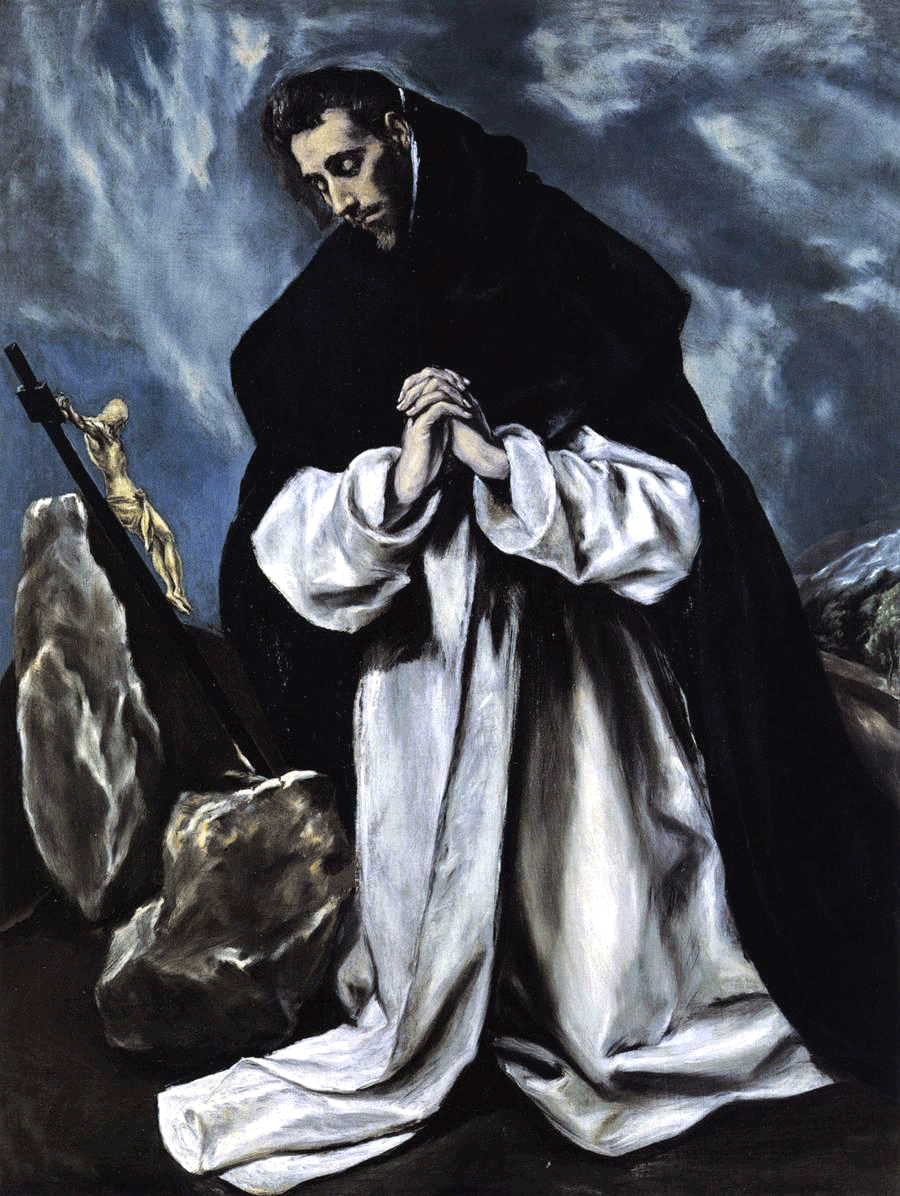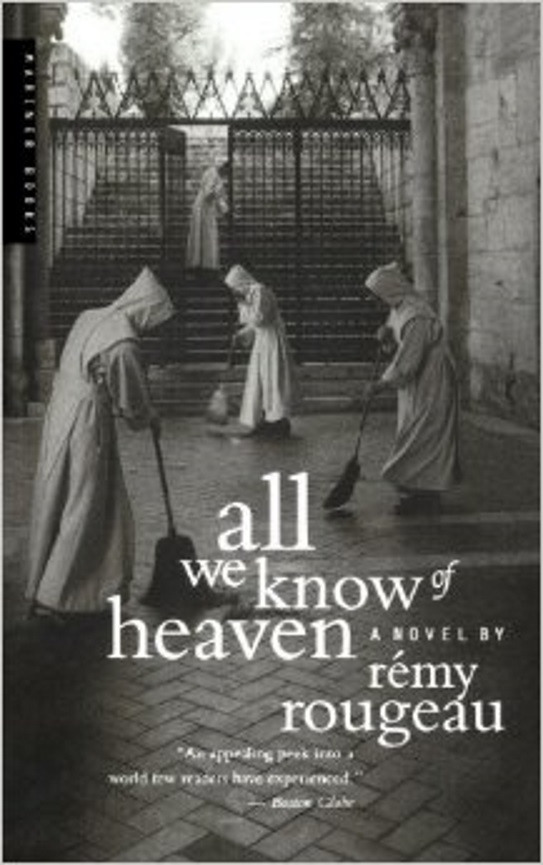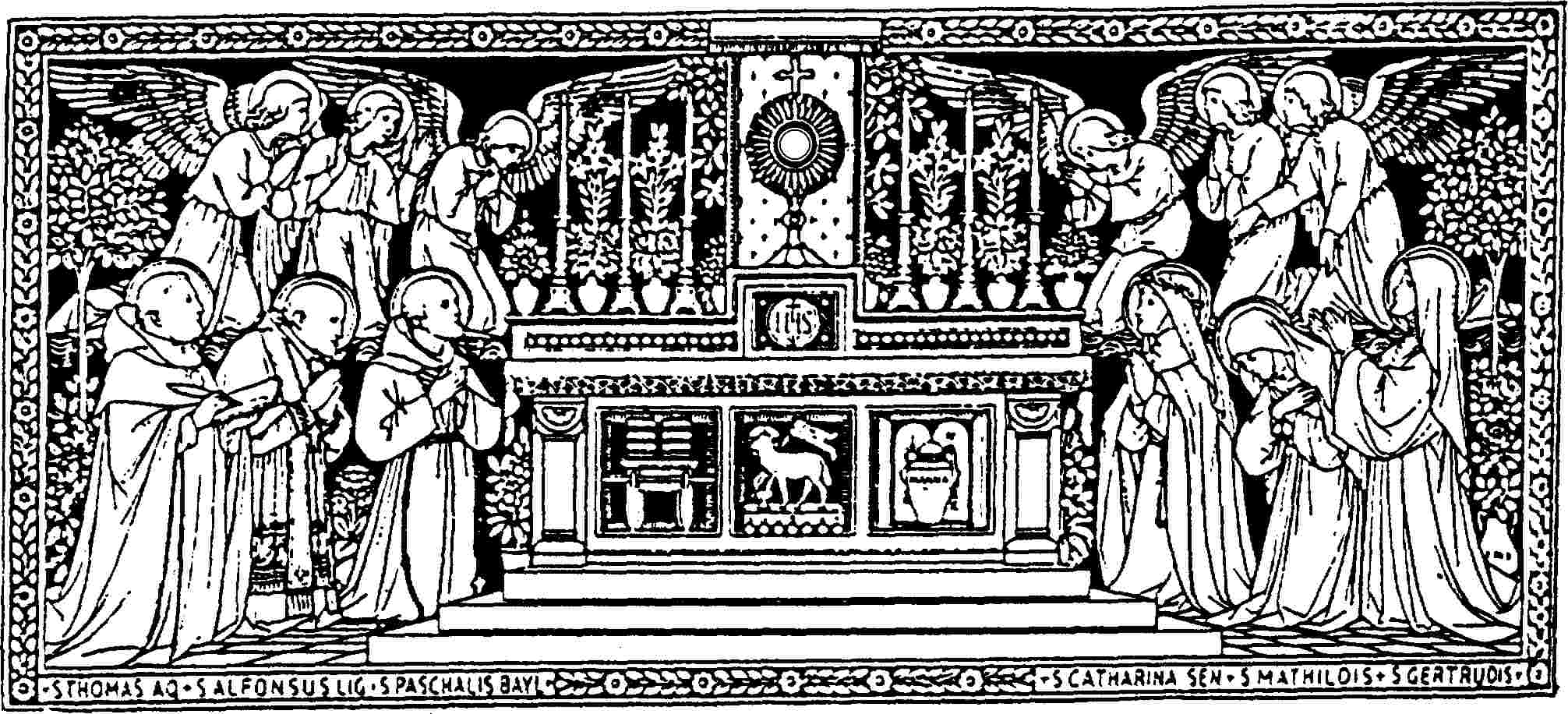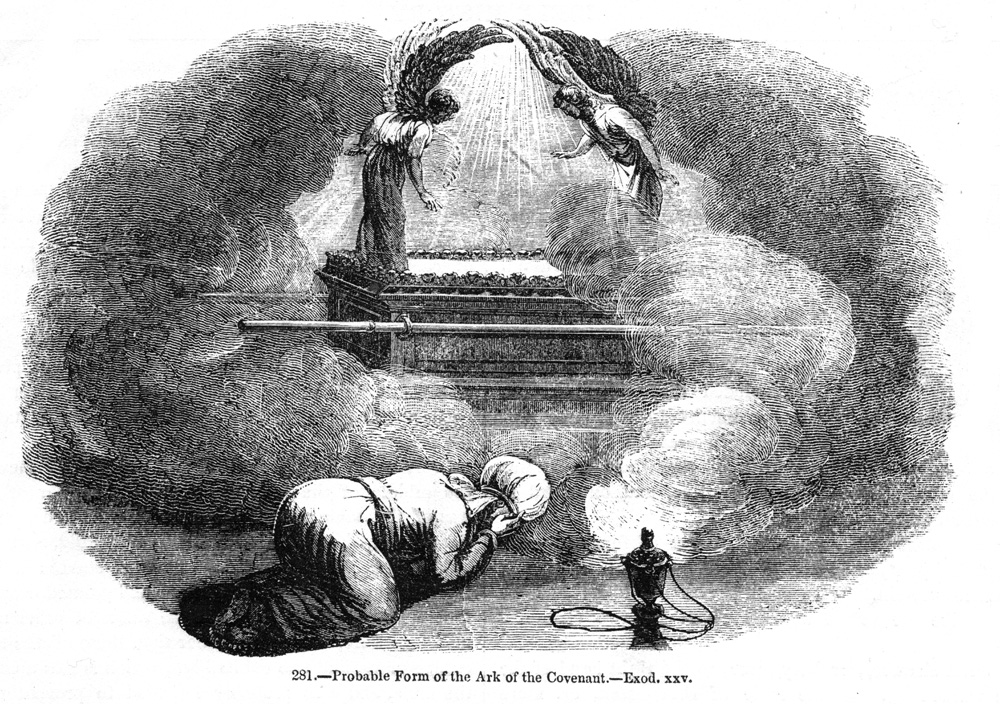…you must not attempt to acquire patience by immediately seeking crosses in which to delight; rather seek first the lowest degrees of this great virtue. Similarly, do not aim at all sorts of virtue—not even many—simultaneously, but cultivate one firmly, then another, if you wish such habits to take deep root in your soul with greater facility. For in the acquisition of a particular virtue, and in the focusing of thought upon its cultivation, the memory will be exercised more in this one line of endeavor; your understanding, enlightened by divine assistance, will find new means and stronger motives for attaining it, and the will itself will be invigorated with fresh ardor in the pursuit. Such concentrated power of action is not possible when the three faculties are divided, as it were, by different objects. –Dom Lorenzo Scupoli ‘The Spiritual Combat’
Archives

A return to the Ascent
Natural knowledge in the memory consists in all the kinds of knowledge that the memory can form concerning the objects of the physical senses—hearing, sight, smell, taste, and touch. The soul must empty itself of all these forms of knowledge and strive to lose their imaginary achievements, so that there may be left in it no impression of knowledge or the trace of anything at all. Rather, the soul must remain barren, as if those forms had never passed through it, and in total forgetfulness and suspension.
This cannot happen unless the memory is reduced to nothing in all its forms in order to be united with God. It cannot happen except by a total separation from everything that is not God. God does not come under any definite form or kind of knowledge in dealing with the night of the understanding. Christ says: No one can serve two masters. So the memory cannot be united both with God and with knowledge. Since God has no form or image that can be comprehended by the memory, then when the memory is united with God it remains without form. Divine union empties its imagination, sweeps it clean of all forms of knowledge, and raises it to the supernatural.
…..
The operations of the soul in divine union are from the Holy Spirit; the actions of such souls are only those that are seemly and reasonable. God’s Spirit teaches them what they ought to know and causes them to be ignorant of what they ought not to know, to remember what they have to remember, and to forget what they should forget. It makes them love what they have to love, and not to love what does not pertain to God…. This spiritual person needs habitually to practice caution: Everything that he hears, sees, smells, tastes, or touches, he must be careful not to store up or collect in his memory, but he must allow himself to forget them immediately.
…..
The first evil (through memory) and, which comes from the world, consists in the souls subjection, through knowledge and reflection, too many kinds of harm, such as falsehoods, imperfections, desires, opinions, loss of time, and many other things that breed impurity in the soul…..The soul is free from all these things if the memory enters into darkness with respect to every kind of reflection and knowledge.
Imperfections meet the soul at every stop if it sets the memory on what it has heard, seen, touched, smelled, and tasted. If it does, some sort of feeling has to cling to it, whether pain, fear, hatred, vain hope, or vain enjoyment…..Many occasions of judging others will also come, since in using its memory, the soul cannot fail to discover the good and the bad in others….. There is no one who can completely free himself from all these kinds of evil, except by blinding the memory and leading it into darkness with regard to all these things.
Let the soul, then, remain “enclosed,” without anxieties and troubles; and the One who entered in physical form to his disciples when the doors were shut and gave them peace, though they neither thought that this was possible nor knew how it was possible, will venture spiritually into the soul without its knowing how he does so, when the doors of its faculties—memory, understanding, and will—are enclosed against all things. He will fill them with peace coming down on the soul, as the prophet says, like a river, taking it from all the misgivings, suspicions, disturbances, and darkness that caused it to fear that it was lost or was or was on the way to being so. Let it not grow careless about prayer, and let it wait in detachment from the world and in emptiness, for its blessings will not be long in coming.
–St John of the Cross ‘Ascent of Mount Carmel’ presented by Henry L. Carrigan Jr.

Saturday porch sitting
The pursuit of the religious life is a challenging endeavor. In reality, all of life challenges. This afternoon, speaking with my landlord/roommate, the Presbyterian minister, he informed me he was fired from his position as a Hospice chaplain. His only source of income. He is devastated. Putting aside personal opinions, offering compassion, I provided fellowship. He wanted to discuss details, telling me a family complained, feeling he overstepped boundaries. Their father was dying and he sat with them. They asked if they could be alone with their father. He responded affirmatively, leaving the room. He could not recall exact details. The day of the event or other specifics, yet he thought he recalled reentering the room. His recollection was cloudy. He then proceeded to inform me he was on probation for complaints from nurses regarding personal conversations. The nurses were uncomfortable with his inquisitive nature. The stunning news only called forth a friendly nature. I halted imagination, not allowing the advancement of speculation. I even stopped him in his exploration of details, stressing it was over. No dwelling. It was time to look ahead. I offered advice. Prayer, without a doubt, was called for; consolation with a spiritual director, a letter of apology to the Hospice. The desolation he expressed could only be properly handled through a mature response. God was speaking.
Jogging and walking today, the maturity I have been centering upon came into finer definition. It is through knowing myself, the accepting of limitations, the recognizing of strengths, and the willingness to endure through vulnerability, weakness and humility. I know who I am and who I am not. Teresa of Avila stresses the determining factor of proper self-knowledge. We cannot mature if we do not see ourselves for who we truly are. In regards to the pursuit of the religious life, that can prove difficult. The majority of pursuers become convinced they can do nothing wrong as long as God is their aim. Many of my quotes from saints touch upon the concept. Those mature in faith understand the intense responsibility and challenge before them. Even under the strictest and most devout pursuit they are on guard against selfish ambitions. They do everything to ensure depth, the avoidance of manipulating faith for self-love. Spiritual maturity is difficult since it is so easy to become self-righteous, self-promoting, constantly seeking those who support and nurture delusion. Water seeks its own level. There is an elderly gentleman at St Paul’s who often looks at me with scrutiny. I feel him questioning my efforts. I admire the man, respecting his humble mature behavior, absorbing his doubt, embracing it as a means of questioning myself, ensuring authenticity. I like the examination.
Reasoning, I determined, a consecrated religious has a greater chance of attaining maturity through the sacrifice and obedience to the Church. They undergo formation through a spiritual director, superiors, education, and fellow religious brothers and sisters. They are forced to answer to those directed upon them. They are held accountable for their words and actions. Acquiescence is a way of life. Through formation a sound prayer life is established. Infusion imparted. God is active in the maturing. Retreats strengthen, alone time with God. The consecrated life is not just taking. It is sacrificing. Speak to consecrated people and most will agree it is belittling at times. They give their very life to the Church. Bishop Sheen has a widely read book amongst religious titled ‘A Priest is Not His Own’. Through such demands of vulnerability and surrendering maturity is achieved. I am convinced for similar reasons marriage offers maturity, while the single life, greater in potential, stagnates most in a life of immaturity. In marriage, one is no longer his or her own.
In regards to the spirituality of Teresa of Avila, advancement from the third room to the fourth, the first truly mystical room, is important to understand. The third room is the advancement of one past the stage of a beginner. However progress has been made through sheer free will, reasoning and conscience. The religious pursuer has done everything themselves. They still do not know themselves, able to identify their weaknesses, and tendencies of self-absorption. Delusion remains. Most will fall in love with looking about the third room. They become attached to socializing, dancing about, developing a reputation, becoming a noted identity, a self-perceived celebrity. Throughout Teresa’s writing she stresses the importance of not becoming enamored with a room, so caught up in looking around, one is never able to advance beyond. The third room most will never exit. Many will regress backwards. It is the room when self-love, the manipulating of faith, hope, and charity for self-aggrandizement becomes a reality. The fourth room is beautiful in being. Once maturing, developing in prayer and the virtues within the third room, one is lifted into the fourth room. Grace is received. Detachment from the world, freedom from the cravings of sin, a presence within the heart flowering; and above all of that, within the stillness and quietness of the inception is the awareness that it is nothing of one’s doing. It is all God. Infusion into a ready, weak, open, vulnerable, and willing individual of prayer and state of grace. A humble person who is truly advancing in self-knowledge.
Mass today brought greater clarity regarding maturity. What it is and what it is not. First, examination of mass preparation. I utilized the wonderful downtown library drive-thru window, picking up an amazing individual I am intrigued by Sister Hrosvitha (many spellings of her name). There will be more on her to come in the near future. An hour remaining to the start of mass, I decided to park my vehicle, enjoying a lake view for pleasantry and meditation. The immensity of Lake Erie, sailing boats decorating, quieted the mind. Walking into mass, a gentleman from early recovery, a kindly devout man, a fine artist, greeted me. I made a point of walking over to him shaking hands. He mentioned Calix would be the following morning, excited, encouraging me to attend. I smiled in reception of the words. Walking to my normal seat, hidden behind a column, I noticed another recovery gentleman, a clownish man, sitting in my row. I just did not feel like another recovery entanglement. I sat in an abnormal seat, feeling exposed throughout the mass. The presence of Ann haunting for usually I can feel her attendance. However within all of this chaos, all glory goes to God, I was able to center myself, focusing fixedly upon God. I felt unsteady, not having my column to my back, yet I honed in. I utilized the distractions to draw me closer to God.
That reminds me of the Homily and a friary incident. It was the feast day of St James, the Brother of Thunder with John of the Gospels, the apostle honored in Spain through the ancient tradition of the Santiago de Compostela. Father Sam designated James as the Greater, also mentioning the other apostle James the Lesser. During friary days, our meals could be raucous events, unless of course silence was ordered. Once the reading was concluded the floor was open to communal conversation. Brother Corey, a lovable Dow Syndrome young man joining the order, a postulant partner, began teasing me. One of my greatest thrills during friary days was Brother Corey searching me out because he missed an office and needed someone to pray with. What a blessing that was. During the teasing, the fun-loving, always ready to joke, Brother Corey kept calling me James the Lesser. His antics erupting great laughter from himself. I could only smile. Brother Pio, in my humble opinion the holiest, most mystical, of the brothers—a future priest who will massively strengthen the Church, striving to do no less than his namesake, Brother Pio sat next to me during Brother Corey’s amusement. He leaned over to me expounding. “It is good he calls you the Lesser. Those who are the least will be first in heaven. James, a Thunder Brother, was greater in the eyes of the world. Who knows who is greater in the eyes of God? It is better for others to look at you as a lesser”. The thought of Brother Pio brings such joy. There is a mature soul, and understand I do not even think he is in his thirties yet. If a reader is curious in the recent photo posted, he is the brother in the third row whom the Bishop’s staff is photographically touching. There were stories that when he first joined, Father worried about him. His voice was so awful, he proved to be an intensely abrasive element during prayers. Another insight. While brother would pray he would lose himself in ecstasies, eyebrows twitching, absolutely lost. Brother Corey would stare, busting into laughter at times. Away from the chapel, you could catch him imitating the strange brow movements. Brother Pio would also position himself absurdly at times. Dramatically kneeling, hands held high in prayer, or clutching his heart with both hands for the entire hour. Never doubting, well to be honest–a statement about me–at times I did, his authenticity. I determined the acts were genuine, and if not his intent was to subject himself to ridicule, scrutiny, and attention in order to battle through them into clear concentration upon emptiness and the absolute reception of the Eucharist. I know attention meant nothing to him. During social events he was approachable, yet disappeared quickly, always opting out of casual socializing whenever nonattendance was offered as an option. I watched him closely, always aware of what he was doing. A man almost half my age, yet I never took my learning eye away from him. I noticed during communal conversation, whenever he determined a conversation devolved into superfluous banter, he politely, nonassertively, slipped away.
Anyway back to mass, this is becoming long, consuming more time then intended, God is good providing and giving to those humble in patience and simplicity. After mass, after the circus departed, in the absence of adoration and regular communal prayer due to a wedding, a handful of people sat in silence and prayer. There was God being revealed, the Eucharist consumed still freshly lingering. It reminds me of a popular child’s story by E.B. White: ‘Charlotte’s Web’. I always admired the beginning. The story starts at an end. A lively country fair is concluded. The remnants of festivities littered about. The fun-loving curiosity seekers parted. That is where the story begins. A Holy Hour before the Tabernacle, quenched through prayer, stillness, and silence. Invigoration ensued. Parting from the Church, the Philippine prayer leader Shirley called me over to her in the gathering room, desiring to know how my retreat went. Through flowing Holy Spirit inspired conversation, she told me something stimulating. During her ‘great conversion’ as she calls it, she spent a three day Eucharistic weekend retreat at St Paschal Baylon with the Congregation of the Blessed Sacrament. The weekend was essential in her formation, sprouting a tremendous devotion to the miracle of the Eucharist. She knew Father Paul Bernier, the fact he served in the Philippines for so many years. She knew his book on the Eucharist. Her mature advice impressed me, she encouraged me to pursue, praising the Third Order of the community, yet also understanding that most important I discern the call of God.
I want to end with powerful words from a priest’s website. He covers Teresa of Avila’s thoughts with intelligence and depth. He is staunch in his reprimand of relying upon centering prayer, a prayer of quieting as an immature approach to faith. The words are Teresa’s. He quotes her several times in proof for his stance against the reliance upon centering prayer. So much other work needs to be done. I toss in the need to always beware of the Eucharist. My quieting is done before the Eucharist, not emptying being filled, often while praying a Rosary or the Divine Office, at times simply talking to the Eucharist. Overall, St Teresa slams home the idea of proper prayer.
Firstly, he who reasons less and tries to do least, does most in spiritual matters. We should make our petitions like beggars before a powerful and rich Emperor; then, with downcast eyes, humbly wait. When He secretly shows us He hears our prayers, it is well to be silent, as He has drawn us into His presence; there would then be no harm in trying to keep our minds at rest (that is to say, if we can). If, however, the King makes no sign of listening or of seeing us, there is no need to stand inert, like a dolt, which the soul would resemble if it continued inactive. In this case its dryness would greatly increase, and the imagination would be made more restless than before by its very effort to think of nothing. Our Lord wishes us at such a time to offer Him our petitions and to place ourselves in His presence; He knows what is best for us. I believe that human efforts avail nothing in these matters. –‘Interior Castle’

Fortitude within labor
The whole inferior part of my being is frequently in revolt; and this causes me much distress. I can but bear with it, knowing that through patience I shall possess my soul. Moreover, I have an ever increasing weariness of my charge, for I cannot endure the labor it entails, and I am obliged to force myself to do the necessary work which is wearisome to both mind and body. No matter how I am occupied my imagination gives me a good deal of trouble, and it all makes me sick at heart. Our Lord permits me besides to have many exterior difficulties, so that nothing in life gives me pleasure save only the will of God…. –St Jane Francis de Chantal

God’s Will: where I am, is exactly where I need to be.
The victory of suffering from ‘All We Know of Heaven’, wisdom within bedtime reading—the ultimate story of the Son of God: the Triumph of Weakness, the crucifixion of Jesus Christ. Antoine observes a visiting Tibetan abbess smash crabapples with her heel into the earth. She, the Venerable Cello–spiritual mother to over six thousand nuns, feeds herself with the dirty created mush. The simple religious woman entered the Cistercian monastery with a group of visiting Tibetan monks. The Trappist were unaware she was a woman until her nickname, Cello, was explained. The holy woman, saying over a thousand rosaries a day, is an immense survivor. When the Chinese occupied Tibet she fled through the Himalayas with thirty of her religious sisters. Only three would survive the mountainous trek. With respect to her gender, she was removed from the Catholic monastery, placed in the guesthouse. Antoine worried she would be insulted. The other Tibetan monks laughed at his concern, expressing the fact Cello would contently sleep upon the sidewalk if asked.
As sunlight drew away from the orchard, it came to him (Antoine), the thread that bound their lives together. Cello was abandoned by society. She was marginal. The abbess was as defenseless and as irrelevant to the world as an orphan. And as a monk, so was he.
The experience of many days clicked into a clear order in his head. Antoine saw before him a Cello who had survived immense suffering in the Himalayas to offer a living witness to anyone interested: nothing less than the reversal of world order. As weak as she was—as weak as all humans are—Cello was fully awake. The wisdom of peace was hers, an old woman grounded in “suchness,” her smile shining through all things and meeting no opposition.
He (Antoine) saw that his own behavior was to blame for his sour discontent. His growth as a monk had been checked by his own longing for a better place to live, better people to live with.

Spiritual Direction
We read in the Chronicles of St Francis, that a secular asked a good religious, why St John Baptist, having been sanctified in his mother’s womb, should retire to the desert, and lead there such a penitential life as he did. The good religious answered him, by first asking this question: pray why do we throw salt upon meat that is fresh and good? To keep it the better, and to hinder it from corruption, replied the other. The very same answer I give you, says the religious, concerning the Baptist; he made use of penance as of salt, to preserve his sanctity from the least corruption of sin as holy Church sings of him, “that purity of his life might not be tarnished with the least breath.” Now, if in time of peace, and when we have no temptation to fight against, it is very useful to exercise our bodies by penance and mortification, with how much more reason ought we do so in time of war, when encompassed with enemies on all side? St Thomas, following Aristotle’s opinion, says that the word chastity is derived from “chastise,” inasmuch as by chastising the body we subdue the vice opposite to chastity; and also adds, that the vices of the flesh are like children, who must be whipped into their duty, since they cannot be led to it by reason. –St Alphonsus Rodriguez ‘The Practice of Christian and Religious Perfection’.
Chastise: 1. To discipline, especially by corporal punishment. 2. To criticize severely. 3. Archaic to restrain; chasten. 4. Archaic. To refine; purify.
St Alphonsus Rodriguez writes guidance for the religious, yet I find his harsh, demanding perspective practical in contemplative pursuits as a layperson, while also touching upon a consideration into living a fully consecrated life. We are either fully in, or we are out. No dabbling. This is not a game of casualness, times of allowing explorations into the secular and nonreligious without salting ourselves. If we are not fully in, we must respect those fully in. Consideration and kindness are deeper than being casual and brash. Defenses must be up, ramparts in place, when journeying through life. I am reading a novel, ‘All We Know of Heaven” by Remy Rougeau, a Canadian Benedictine monk writing about a nineteen year old entering a Cistercian monastery. The novel captures me with its concise matter-of-fact, drab delivery; a boringness to the entire endeavor that pleases. Brutally honest realism, I suppose, with respect to Thomas Merton’s ‘Seven Story Mountain’. Poignantly ironic, I find the work of fiction realistic, and the biography delusional. In the novel there is not an underlying need for the author to establish himself as a recognized intellectual, an academic authority, a pop culture religious/literary celebrity. This is simply a monk telling a simple story. There is no great exploration of larger than life ideals, no religious history, nor romanticizing through flowery language, no desiring to expose the mystical and supernatural (a criticism I should consider reflectively), no tendency toward psychological self-absorbing introspections, no exposing of one’s inner-most being, no long sentences—saying so many things in a quick spewing. It is a simple realistic view into the occurrences within the life of a young man entering a Canadian Trappist monastery. Ordinary, yet set apart, an original thing in the world. Things can be defined by what they are not. “He walked into the house (his parent’s home after a week at the monastery) and felt as though he had returned from a foreign country; the television seemed a very odd contraption.”
No time, and thoughts are not coming out. I was aiming for the idea that God did not sacrifice His Son over two thousand years ago, and aside from the Church, basically disappear from the ways of man accidently. A God of order, there is a divine plan in place. It is difficult, demanding penance, mortification, and dedication, obviously trust and confidence, as well as obedience and surrender, the following of the ways of the Church if serious depth is to be achieved. Within and through the ordinary, the boring and mundane, we come into actualization, yet the process is difficult, the ways of the saints rigorous, brutal, and nearly impossible in regards to application. Divine assistance please subtly abide. The extraordinary existing within the ordinary takes a fine process of revealing; romantic traps, emotional enticements, egotistical needs, the desire for intellectual gratification, artistic expression, boredom, and the flesh are always posed for a gradual or immediate devouring. Not sure I am pleased with this entry, struggling personally with respect to perfection and longing for Ann–some days are difficult, yet never will I fully concede defeat, for as St Liguori teaches, the greatest defeat is to lose hope. My friend with the Catholic bookstore has a sign above her front door, above a holy water dispenser, ‘All yee who enter, abandon despair’. Always through faith, hope, charity and GRADUALNESS within fortitude, perseverance, and understanding–‘gratefulness for progress achieved’ maintained as a driving force, I move forward. To dabble or sit casually still is to die. The sitting still must be done with precise purpose, adorably and prayerfully in the presence of the Eucharist. Dentist appointment this morning, natural world calls, salting performed.

Benediction: Corpus Christi
To go beyond formality and tradition, to see the truth and essence of words, thoughts, conceptions, possibilities and the deepest penetrating realities, I find the words of the the Benediction hymns profound, worthy of continual contemplation. Terms to consider: saving victim; immortal Godhead, one in three; native land; down in adoration falling; ancient forms departing; newer rites of grace prevailing; feeble senses fail; faith for all defects supplying; the Trinity beautifully unveiled.
O Saving Victim, opening wide
The gate of Heaven to man below:
Our foes press on from every side,
Thine aid supply, Thy strength bestow.
To Thy great Name be endless praise,
Immortal Godhead, One in Three:
Oh, grant us endless length of days
In our true native land with Thee. Amen.
Down in adoration falling,
Lo! the sacred Host we hail;
Lo! over ancient forms departing,
Newer rites of grace prevail;
Faith for all defects supplying
Where the feeble senses fail.
To the Everlasting Father,
And the Son Who reigns on high,
With the Spirit Blest proceeding
Forth from Each eternally,
Be salvation, honor, blessing,
Might and endless majesty. Amen.
Thou hast given them Bread from Heaven.
Containing in Itself all delight.
Let us pray (oremus)
O God, Who in this wonderful Sacrament
has left us a memorial of Thy passion,
grant, we implore Thee,
that we may so venerate the sacred mysteries of Thy Body and Blood
as always to be conscious of the fruit of Thy Redemption,
Thou Who livest and reignest forever and ever.
Amen










Recent Comments